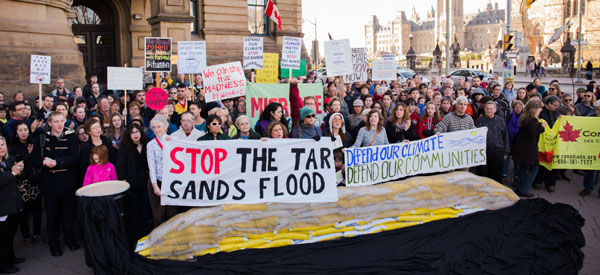Chip in to keep stories like these coming.
Even though it is very likely that TransCanada has sought to suspend its application for its proposed 830,000 barrels per day Keystone XL pipeline in order to stave off an imminent veto by U.S. president Barack Obama, we can rightly celebrate that the project continues to be mired in controversy and delays.
But there is an additional point to consider about this.
The Canadian Press reports, “Like a game of pipeline whack-a-mole, a bid by TransCanada Corp., to suspend its controversial, north-south Keystone XL pipeline proposal has elevated the west-east Energy East pipeline plan to the top of Canada’s political agenda.” Donald Arsenault, New Brunswick’s energy minister, says, “There’s no doubt it puts a whole lot more attention now on Energy East.”
The Council of Canadians has been campaigning against the proposed 1.1 million barrels per day Energy East pipeline that would stretch about 4,600 kilometres from the tar sands in northern Alberta to a tank farm and deep water export terminal for supertankers in the Bay of Fundy at Saint John, New Brunswick.
Additionally, Reuters is now reporting, “TransCanada Corp said on Tuesday [Nov. 3] it is very close to reaching a decision on an alternate crude oil export port for the Energy East pipeline after a proposed terminal [on the St. Lawrence River] in Quebec was cancelled earlier this year. TransCanada will also have a terminal at the pipeline terminus in Saint John, New Brunswick.”
There has been previous speculation that the second terminal could be located near Lévis, Bécancour or Baie-des-Sables. These Quebec communities are all situated on the St. Lawrence River. We oppose all of these possible locations. Council of Canadians chairperson Maude Barlow has stated, “To protect the St. Lawrence River we must ban all transport of tar sands bitumen on or near the St. Lawrence River.”
There were also news reports last year that the Energy East pipeline could be extended an additional 500 kilometres from Saint John to a Strait of Canso terminal in Point Tupper, Cape Breton Island, Nova Scotia. That terminal is now almost 50 years old and there are small oil leaks there roughly twice a year due to age, rust and corrosion.
The Council of Canadians is calling for a restoration and enhancement of the protections taken from the Navigable Waters Protection Act by the Harper government at the behest of Big Oil and pipeline companies. We are also calling for Harper’s Canadian Environmental Assessment Act (2012) to be replaced by a new Sustainability Assessment Act that would ensure all proposed projects are assessed on the basis of their individual and cumulative impacts and upstream and downstream climate pollution. This new Act would also ensure fair public participation and respect for Indigenous rights.
That’s not what the new Trudeau government appears to be promising at this point.
Another Reuters article this week notes, “The Liberals, set to take power after defeating the pipeline-friendly Conservatives in last month’s Canadian election, had pledged to ‘restore robust oversight’ into the environmental assessment process. The Liberal source, who spoke on condition of anonymity, said Energy East approval could be delayed while changes are made, but the project would not necessarily be killed. ‘Energy East could happen as long as it meets all the criteria and community buy-in and is done in an environmentally sustainable way,’ the source said. ‘We’re open to Energy East as long as it goes through a very thorough environmental review.'”
Given the Energy East pipeline project would facilitate a 40 per cent expansion of the tar sands in northern Alberta, and given the scientific fact that 85 per cent of the tar sands must remain in the ground to keep global warming below the 2 degrees Celsius upper limit, we strongly disagree that the project could be done “in an environmentally sustainable way.”
For more on our campaign to stop the Energy East pipeline, please click here.
Chip in to keep stories like these coming.




